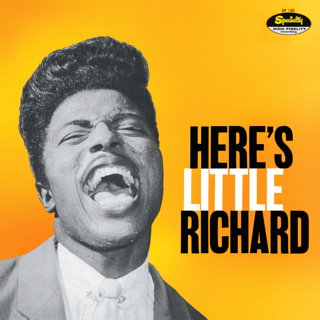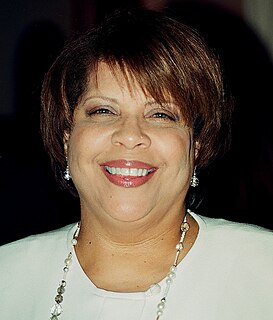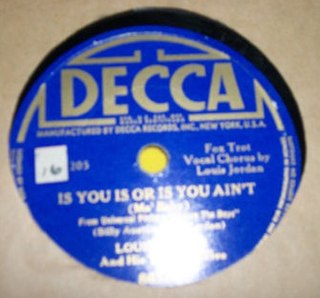
Dinah Washington was an American singer and pianist, who has been cited as "the most popular black female recording artist of the 1950s songs". Primarily a jazz vocalist, she performed and recorded in a wide variety of styles including blues, R&B, and traditional pop music, and gave herself the title of "Queen of the Blues". She was a 1986 inductee of the Alabama Jazz Hall of Fame, and was inducted into the Rock and Roll Hall of Fame in 1993.

Kai Chresten Winding was a Danish-born American trombonist and jazz composer. He is known for his collaborations with trombonist J. J. Johnson. His version of "More", the theme from the movie Mondo Cane, reached in 1963 number 8 in the Billboard Hot 100 and remained his only entry here.
Bronisław Kaper was a Polish film composer who scored films and musical theater in Germany, France, and the USA. The American immigration authorities misspelled his name as Bronislau Kaper. He was also variously credited as Bronislaw Kaper, Bronislaw Kapper, Benjamin Kapper, and Edward Kane.

Here's Little Richard is the debut album by American musician Little Richard, released on March 4, 1957. Promoted as "six of Little Richard's hits and six brand new songs of hit calibre", the album compiles many of the A-sides and B-sides from Richard's hit singles including the Billboard top 40 entries "Tutti Frutti", "Long Tall Sally", "Slippin' and Slidin'", "Rip It Up" and "Jenny, Jenny" and the top 10 Rhythm and Blues Best-Sellers hits "Ready Teddy", "She's Got It" and "Miss Ann".

Urban Clifford "Urbie" Green was an American jazz trombonist who toured with Woody Herman, Gene Krupa, Jan Savitt, and Frankie Carle. He played on over 250 recordings and released more than two dozen albums as a soloist. He was inducted into the Alabama Jazz Hall of Fame in 1995.

Patti Austin is an American R&B, pop, and jazz singer and songwriter.
Harry Akst was an American songwriter, who started out his career as a pianist in vaudeville accompanying singers such as Nora Bayes, Frank Fay and Al Jolson.
"Do Nothing till You Hear from Me" is a song with music by Duke Ellington and lyrics by Bob Russell. It originated as a 1940 instrumental that was designed to highlight the playing of Ellington's lead trumpeter, Cootie Williams. Russell's words were added later. In 1944, Ellington's own recording of the song was a number one hit R&B chart for eight non-consecutive weeks and number six on the pop chart.
"For All We Know" is a popular song published in 1934, with music by J. Fred Coots and lyrics by Sam M. Lewis. Popular versions in 1934 were by Hal Kemp and Isham Jones.
"Mad About the Boy" is a popular song with words and music by actor and playwright Noël Coward. It was introduced in the 1932 revue Words and Music by Joyce Barbour, Steffi Duna, Norah Howard and Doris Hare. The song deals with the theme of unrequited love for a film star. It was written to be sung by female characters, although Coward also wrote a version which was never performed, containing references to the then-risqué topic of homosexual love. The song gained new popularity in 1992 when Dinah Washington's rendition was used in the Levi's television advertisement "Swimmer", directed by Tarsem Singh.

Melba Doretta Liston was an American jazz trombonist, arranger, and composer. Other than those playing in all-female bands she was the first woman trombonist to play in big bands during the 1940s and 1960s, but as her career progressed she became better known as an arranger, particularly in partnership with pianist Randy Weston. Other major artists with whom she worked include Dizzy Gillespie, Billie Holiday, John Coltrane and Count Basie.

"Is You Is or Is You Ain't My Baby" is a song written by Louis Jordan and Billy Austin. The song's first recording, by Jordan, was made on October 4, 1943. It was released as the B-side of a single with "G.I. Jive" with the title "Is You Is or Is You Ain't ". The song reached No. 1 on the US folk/country charts, number two for three weeks on the pop chart, and number three on the R&B chart.

"Why Was I Born?" is a 1929 song composed by Jerome Kern, with lyrics written by Oscar Hammerstein II.

"And Her Tears Flowed Like Wine" is a popular song and jazz standard by Stan Kenton first released in 1944.
Dirty blues encompasses forms of blues music that deal with socially taboo and obscene subjects, often referencing sexual acts and drug use. Due to the sometimes graphic subject matter, such music was often banned from radio and only available on a jukebox. The style was most popular in the years before World War II, although it had a revival in the early 1950s.
"Big Ten Inch Record", also known as "Big Ten-Inch ", is a rhythm and blues song written by Fred Weismantel. It was first recorded in 1952 by Bull Moose Jackson and released by King Records. The song was later covered by Aerosmith and released as part of the 1975 album, Toys in the Attic. It has been rated as one of the best double entendre songs of all time.

Dinah! is a fourth studio album by blues, R&B and jazz singer Dinah Washington released on the EmArcy label. The album includes a mix of jazz, popular and blues standards of the period, all selected to emphasize the vocalist's style.

Joseph Perkins Greene was an American songwriter, best known for "Across the Alley from the Alamo", "And Her Tears Flowed Like Wine" (1944), and "Don't Let the Sun Catch You Cryin'" (1946).
"It Ain't the Meat ", also known as "It Ain't the Meat", is a rhythm and blues song written by Henry Glover and Syd Nathan. It was first recorded in 1951 by the Swallows and released by King Records. It was later covered by Maria Muldaur in a 1974 version that has been credited with popularizing the song's title phrase as a proverb, referring to the importance of a man's sexual technique over the size of his penis.
"Keep On Churnin' " is a rhythm and blues song written by Henry Glover, Jester Hairston, and Lois Mann. It was first recorded in 1952 by Wynonie Harris, with backing from the Todd Rhodes Orchestra, and released by King Records. The song was also recorded by Hank Ballard and the Midnighters. It has been rated as one of the best double entendre songs of all time.











